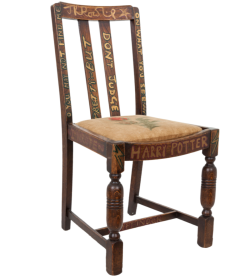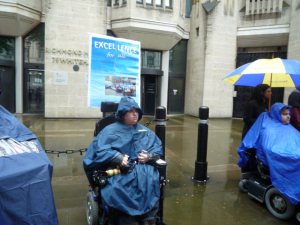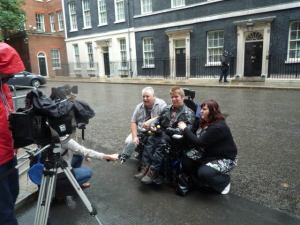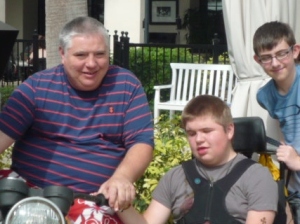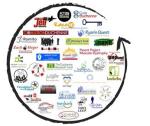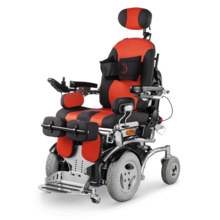
This chair costs a mere £25,000
Or should I say, not just a chair? A wheelchair for Matthew is like back, legs and arms to the rest of us. Due to Duchenne muscular dystrophy, Matthew’s muscles are becoming so weak that not only can he not stand up, he relies on steel rods in his spine to maintain his posture, and he relies on the arm supports fitted to his wheelchair to help him to feed himself, or even just scratch his nose.
Matt has been using a powerchair for several years, and as far as getting about is concerned, what he has at the moment works just fine. But a replacement like the Meyra Nemo would give Matthew some of his independence back. Because he can’t support himself at all, Matthew needs two carers to help him with his basic needs. It’s bad enough having to rely on one person to help you go to the loo, but Matthew has got used to that. Needing two helpers, and the space for them to manoeuvre him, severely limits the places Matthew can go. So that’s one thing…..
Now imagine spending all day sitting in the same position. Every day. Of course the people looking after him will move him if he asks. but would you want to keep asking someone to tilt you this way or that every so often? And that is just slight changes in position. The most beneficial movement for Matthew is for him to spend some time each day in a standing position, and he is one of the few people of his age, with his condition, who can do that, with support. It is incredibly beneficial, because it allows his internal organs to recover somewhat from being permanently squashed. He does it at the moment with the help of a standing frame, but again he needs two people to help him to do that. This is generally his dad and stepmum, at home. If he feels like a stretch during the day, when he is at college, that is just his hard luck..
With a chair such as the Nemo, it would be Matthew’s decision when to move to a standing position, so not only would he feel more comfortable, he would also be able to bring himself to full height when talking to his tutors and college friends – a much more equitable situation than at present. Or he could remain seated while talking head to head. The important thing is that he would have a choice. He would also be able to lie down without having to ask to be put to bed.
As the strength of Matthew’s hands and arms deteriorate, it makes sense for him to develop his IT skills. Matthew is an expert in music technology applications, but it is becoming increasingly difficult for him to use a traditional laptop or PC keyboard. Wireless technology means that he would be able to link to a computer straight from his chair, and potentially control all sorts of Bluetooth devices through it – great news for a music-lover!
Matt is very fortunate to still be able to manage solid food. I have just heard of a boy who is not quite nine who is starting to struggle with eating, and it is very common for those in their teens to have had to switch to liquids only, and ultimately tube feeding. Clearly, the ability to move to a standing position will aid Matthew’s digestive processes while he is still able to chew.
But, like so much of Matthew’s life, raising funds for the chair has become a race against time. If he’s going to get the most out of it, he needs to start using it now.
If you can help, please visit the justgiving page set up by the TurboTrust to help with the purchase:
